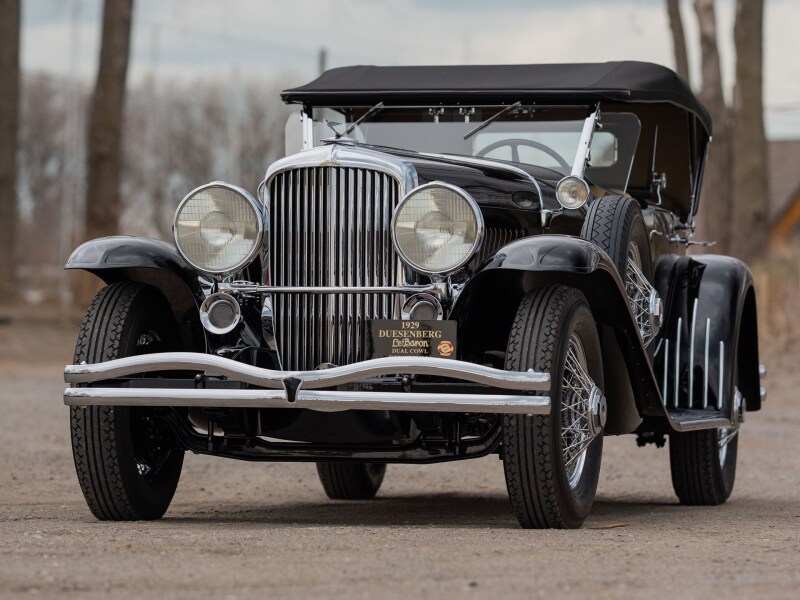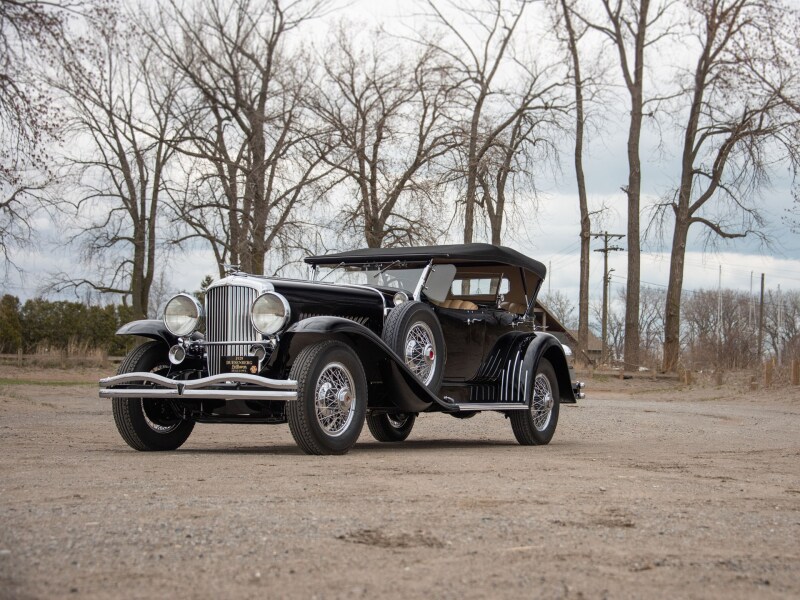









Dusenberg
Model J Sweep Panel Phaeton by LeBaron
Price:
Taxes not included
VAT and other taxes are not reflected in the listed pricing. Read more
Ships from: Oklahoma, United States
This item ships within United States only
Authenticity guaranteed
We guarantee the authenticity of this item.
Details
Description
Originally delivered to Philip K. Wrigley, heir to the Wrigley chewing gum fortune
• Full restoration by Brian Joseph completed in 2004
• Nearly thirty years of single ownership in the Terence E. Adderley collection
• Retains its original chassis frame, firewall and engine
• Best of Show at the 2010 ACD Club National Reunion
• Shown at the Pebble Beach Concours d’Elegance in 2004 and 2022
In the mid-1930s, a few years before the company was sold and dissolved by E.L. Cord in 1937, Duesenberg ran a simple yet effective ad campaign to entice those that could afford their spectacular cars to experience the very best automobile built in the United States and, arguably, the world.
Appearing in magazines such as Country Life and Vanity Fair, these ads would feature a simple black and white drawing of a glamorous, wealthy-looking individual in an equally glamorous setting. Examples of this included a man dressed in a sweater and tie, smoking a cigar, and standing on a yacht looking off into the distance, or a woman wearing high heels and a long dress speaking to a groundskeeper while overlooking an expansive garden.
No car was included in the drawing, and these drawings were always captioned with just four words: He (or She) Drives a Duesenberg.
When you produce what is considered to be the finest automobile in the world, why advertise the car itself? Advertising a lifestyle is a more powerful way of showcasing that your product fits within the existing lifestyle of your target clients. If you own a yacht or a statement property, why not own an automobile of equal stature?
As one would expect, and as Duesenberg so accurately advertised, there was no such thing as a boring original owner of a Duesenberg, and Philip K. Wrigley is no exception to that rule.
Born in 1894 as the son of William Wrigley Jr, his father had founded the Wm. Wrigley Jr. Company in 1891 in order to sell soap. Transitioning to baking powder, Wrigley offered two packages of chewing gum with every sale of baking powder but quickly found that the gum was more popular than the baking powder it was sold with, so he changed his business to meet his clients' chewing gum needs. The rest is history. Wrigley quickly became a household name and amassed a huge fortune as a result.
Outside of chewing gum, William Wrigley Jr. became the majority owner of the Chicago Cubs in 1921, and the family was also a major shareholder in the Auburn Automobile Company, allowing them prime access to the very best cars that the company had available. According to Duesenberg historian Randy Ema, this allowed them to purchase their Duesenbergs at cost directly from the factory. Working in the family business, Philip Wrigley assumed the position of CEO and also presided over his family’s ownership of the Chicago Cubs following his father’s death in 1932, seeing both the company and the baseball team grow during his tenure.
This particular Duesenberg, chassis number 2177 (bearing engine number J-121), was delivered to Philip Wrigley on July 9, 1929 with Convertible Coupe coachwork by Murphy. However, the car would only retain that bodywork for just over a year and some 10,400 miles. A body swap was carried out between J-121 and J-147, which bore LeBaron "Sweep Panel" Dual-Cowl Phaeton bodywork and was owned by H. Leslie Atlass, a CBS executive in Chicago and friend of the Wrigleys. To Wrigley, swapping the bodywork was preferable to trading cars. After all, Wrigley had been to the Duesenberg factory personally to oversee and participate in J-121’s construction. As a result, he wanted to keep the original chassis, engine and drivetrain, but preferred the LeBaron coachwork of Atlass’ car. Auburn Cord Duesenberg Club Duesenberg historian Ray Wolff noted that Atlass’ LeBaron coachwork was originally black with a dove grey "sweep panel," 19-inch wheels, and chrome disc wheel covers. Wrigley retained ownership of J-121 until 1936, trading the car back to the factory. However, it is likely that the trade occurred in Southern California. Wrigley had a house in Pasadena, and the car resurfaced in the area following the conclusion of World War II.
After the war, J-121 worked through two owners in quick succession in 1945, all within Southern California. It finally wound up with Thomas Corn, an early Duesenberg enthusiast in Orange County who owned another Duesenberg with LeBaron phaeton coachwork at the time. Arranging a payment plan to complete his purchase, the last installment entailed completing engine work on a Mercedes-Benz for J-121’s previous owner. Unfortunately, the Mercedes-Benz engine threw a rod, subsequently landing J-121 in a storage yard while Corn completed his military service.
In 1948, J-121 was purchased out of the storage yard for a princely sum of $20 to Clinton A. Reynolds of Anaheim. Another noted enthusiast of pre-war automobiles, the Duesenberg remained in Reynolds’ ownership until his passing in December of 1962. At that point, the car was inherited by his son-in-law Robert E. Garrison, who was married to Reynolds’ daughter Evalyn. The Duesenberg remained stored with the Garrisons for nearly two decades before it was finally sold to Phil Renick, a well-known Cadillac dealer and a prolific collector of Duesenbergs. Upon his purchase, Renick had his restorer, Tony Antone, fully restore the car in two-tone green with a brown leather interior. After the completion of the restoration, the car was pictured in an article on Renick’s Duesenbergs in the June 1973 issue of Car Classics magazine.
That same year, J-121 was sold by Renick to Burt Sugarman of Beverly Hills, a television producer best known for his work on The Midnight Special. The car’s next owner would be Harry Rinker of San Clemente, California, who acquired it from Sugarman in 1981. Rinker, a noted collector of pre-war automobiles and American classics, would go on to own the car until 1992. The car’s next owner would see its first departure from Southern California since it was acquired new by Wrigley. Joining the collection of Terence E. Adderley, a very well-known collector of American classics, with a focus on Auburns, Cords and Duesenbergs, and often considered one of the finest collections of these cars.
Opting to keep J-121 in its Rinker-commissioned restoration for the first decade of his ownership, Adderley later commissioned renowned Duesenberg specialist Brian Joseph of Classic & Exotic Service in Troy, Michigan, to fully restore the car. The restoration was completed in 2004 and was shown at the Pebble Beach Concours d’Elegance that year, placing third in the Duesenberg class behind two highly significant disappearing-top convertible coupes. J-121’s next major showing was at the ACD Club National Reunion in 2010, where it received the Fred and August Duesenberg Trophy for Best Duesenberg, as well as the Harold Ames Trophy for Best of Show. It is worth considering that this reunion saw the largest-ever gathering of Duesenbergs in one place, having forty cars take part in the show on Saturday and approximately thirty-five other Duesenbergs present in Auburn that weekend, for a total of seventy-five cars!
Following Adderley’s passing in 2018, the car was sold from his collection in 2021 to another collection of significant American pre-war cars that is no stranger to Duesenbergs. Upon arrival at its new home, the car received a minor cosmetic and mechanical refreshening as Brian Joseph’s restoration had been remarkably well preserved. The car returned to the Pebble Beach Concours d’Elegance in 2022, again placing third in class.
Retaining its original chassis frame, firewall, and engine, as well as the LeBaron bodywork swapped at the request of its very special first owner, J-121 is a spectacular car and represents an opportunity for that enthusiast to become the man (or woman) who drives a Duesenberg.
Condition Report
Car Type
Convertible
Car Style
Pre-War American Classics
Region
Country
Year
Color
Black
Chassis Number
Engine Number
Body Number
Conditions of Business
Please note that the cancellation right for EU/UK purchasers applies to this item. Please read Condition 19 of the Buy Now Marketplace Conditions of Business for buyers for more information. Read more here.